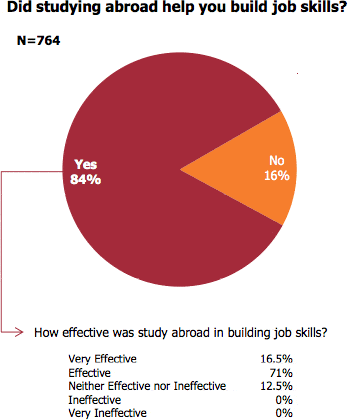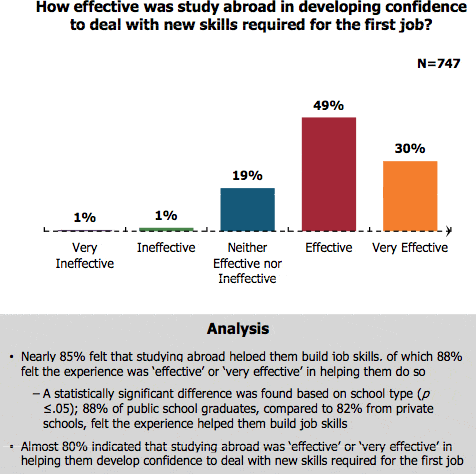Study Abroad Increases Professional Job Prospects
By Isabel Eva Bohrer
Graphs, photos, and quotes courtesy of IESAbroad.org
Updated 6/7/2024 by Transitions Abroad
 |
|
IES Abroad European Union student Sam Holden is visiting the European Investment Bank in Luxembourg.
|
Economic crises, changing exchange rates, and high travel expenses are some of the main reasons why the previously meteoric rise in students studying abroad had been decreasing even before the global COVID-19 pandemic, whose elimination and repercussions still need to be understood entirely. Not only are expenses associated with studying abroad increasing, but at the same time, scholarships, financial aid, grants, and fellowships that used to be available to study abroad students are thought by some to be hard to obtain. In addition, the national economic cuts and often shortsighted politics ensue. Some students can't help but wonder: "Is studying abroad really worth it?" The truth is that not only is it worth it to you in the long run, but much work is ongoing to help students out financially to allow them to go abroad, and for essential reasons, as we will demonstrate.
"International experience is one of the most important components of a 21st century resume." — Dr. Allan E. Goodman, President and CEO, Institute of International Education.
Looking at the big picture, the reliable pre-pandemic Open Doors 2019 data published by the Institute of International Education (view the yearly study abroad . PDF reports for interesting details by region and country) indicates that 341,000 U.S. students received credit for study abroad during 2017-18, an increase of 2.7% percent over the previous year. Approximately 25% of these students majored in STEM fields, 20% in Business, and 17% in Social Sciences, with others concentrating on subjects such as language and the liberal arts. The Open Doors findings reflect that students often study abroad to gain international experience they can apply in their careers. Data also demonstrates that an increasing number of U.S. students — 38,000+ — participated in non-credit work, including paid and unpaid internships and volunteering abroad to gain practical skills and broaden life experience.
New Study Abroad Goals and Initiatives
Nevertheless, the 2.7% increase year-over-year in pre-pandemic 2019 represented a relatively small growth relative to gains over the previous 30 years. The White
House Summit on Study Abroad and Global Citizenship under the Obama administration announced many promising initiatives, the goal of substantially increasing study abroad among all ages and underrepresented members of American society. As Assistant
Secretary of State for Educational and Cultural Affairs, Evan Ryan strongly affirmed at the Summit, "At the Department of State, we want to increase the overall number of Americans studying abroad, and do so by better reaching parts of American society that are currently underrepresented. We desire to see more young people travel to destinations where fewer Americans have studied, and to learn critical languages like Arabic, Chinese, Hindi, and Russian."
The Institute of International Education, via its Generation Study Abroad initiative, has set a goal to double the number of study-abroad participants by the end of the decade. Thus far, it has succeeded in creating a path toward outstanding progress in growth and especially in diversity, even given the headwinds of the global pandemic.
Yet changes in the economic climate often mean that students must be creative and resourceful when answering whether studying abroad is a good "investment" in every sense.
At the White House Summit, Secretary of Commerce Penny Pritzker reinforced the value of an investment in study abroad at this time by citing that "a MetLife survey found that 65 percent of Fortune 1000 executives identified global awareness as 'very important' or 'essential' in order to be ready for a career." Penny Pritzker also noted that "it is in our national economic interest to be fully engaged and knowledgeable about cultures and people across the globe," a sentiment echoed strongly by all White House administration speakers at the Summit, including the Chief of Staff.
Is Study Abroad Always Worth It?
"Yes" would be the answer of any study abroad fan, including myself, a Student Advisor columnist for Transitions Abroad. While I used to have to present arguments for the many reasons in favor of studying abroad, there is new data to support my thesis.
In March 2012, IES Abroad surveyed 1,008 study-abroad alumni to "assess the impact study abroad has on a recent graduate's prospects in securing employment and/or attending graduate school directly after earning a degree from a four-year college or university in the U.S." Elaborating on an earlier IES Abroad survey investigating the benefits
of study abroad and published by Transitions Abroad, the key
findings of the survey showed:
- Nearly 90% of study abroad alums secured a job within the first six months after graduation.
-
50% felt the overseas experience helped them acquire their first jobs.
-
84% felt that studying abroad helped them develop valuable job skills such as foreign language knowledge, cultural training, tolerance for ambiguity, adaptability, communication, and more.
- 90% were admitted into their first or second-choice graduate or professional school.


Graphs courtesy of IESAbroad.org
Why is Study Abroad Such a Resume Builder?
“Studying abroad really tests your understanding of the world, your adaptability, and opens your mind to new ways of approaching everyday problems and situations; it makes you a better learner and a better critical thinker.”
— Samantha Lockhart, College of William and Mary | IES Abroad Delhi
"Ready, set, build your resume!" Although this is no official slogan for studying abroad, it could be. Already in the planning stage, studying abroad helps you build valuable skills that only strengthen while abroad. If that were not enough, once you return home, you will learn even more as you reflect upon your experiences abroad and adapt to life back home.
Here are just a few of the skills strengthened by study abroad:
- Foreign language fluency. Whether you translate archives at a museum or plan on corresponding with businesses worldwide, being fluent in languages other than English can be very useful.
- International knowledge base. Your acquired knowledge is beneficial for careers in international affairs, government service, or international business but can apply to any field.
- Cross-cultural communication. In addition to speaking the actual language, studying abroad can help you hone in on other communication skills.
-
Analytical skills. As you interact with the local population abroad, you will learn to analyze situations with more precision.
-
Teamwork. You will likely interact with the local population and fellow foreigners abroad, strengthening your ability to work as a team player and even take on leadership roles where appropriate.
- Flexibility. Studying abroad involves adapting to new circumstances, which is often critical when solving problems back home.
-
Problem-solving for the unknown: The pandemic has brought to light, more than ever, the need for skills and unimaginable flexibility to adapt and problem-solve given unknown situations to perform your work and make decisions.
- Ability to manage finances. As a study abroad student, you must manage your money effectively, which includes understanding the financial aid process and how best to reduce your general expenses abroad.
- Independence. When living alone, you will have to learn to become independent. As you mature, you will also learn to become more self-confident.
The IES Abroad study reaffirms that employers and graduate schools value the above skills.
 |
| IES Abroad Buenos Aires student Jonathan
Blakely volunteering in the Guaraní community. |
 |
| IES Abroad Tokyo student Leah Weintraub at her teaching field placement in Tokyo. |
Study Abroad Gives You a Competitive Edge
“I have definitely matured due to my experience studying abroad. I feel more confident and ready to take on the world.” — Rishi Sethia, Indiana University | IES Abroad Santiago
The inevitable cycle of economic crises can result in job layoffs. While it is not always possible to generalize whether less qualified staff will be the first layoffs, concluding that having a competitive edge will increase your job prospects is generally valid. Studying abroad, improving your cross-communication skills, and becoming fluent in a foreign language will make you stand out from many other candidates applying for any open position.
Therefore, on your resume, indicate your international experience and the skills you have acquired while abroad. Similarly, you may highlight specific instances of effectively adapting to challenges abroad during an interview. See “Marketing Study Abroad” for more information. If employers know you can adjust to difficult situations in a foreign country, you can probably solve problems back home. Problem-solving has become a more treasured skill in almost all professions, even and perhaps especially with the recent emergence of powerful new, ubiquitous, but imperfect tools based upon AI.
Study Abroad Opens Up Options Abroad
“Studying abroad redefined my life by allowing me to apply a broader mindset to daily life. It allowed me the opportunity to meet people from all over the world and experience an independence that can only be found while studying in a foreign country.” — Elizabeth Goodrich, Wittenberg University | IES Abroad European Union
In addition to increasing your chances of getting a job when you return to the United States, study abroad can also open up options in your host country. I have known numerous students who stayed in their host country for the summer following a spring semester study abroad. Others decided to come back after graduation. While the reason could be "because they liked it so much in X [insert host country here]," there is often more to it than that motivation. Host countries frequently offer a springboard for professional opportunities abroad.
A Great Way To Increase Your Job Prospects In A Host Country Is To Volunteer Or Intern
“Through IES Abroad, I was set up at a local school for children with Down’s Syndrome, working alongside the music therapists on staff. I had a unique chance to practice my Spanish, witness a slice of Chilean culture I would have otherwise missed, and also familiarize myself more with the profession. As a result of the incredible experience, I decided to pursue music therapy as a career.” — Caitlyn Bodine, Southwestern University | IES Abroad Santiago
You already have one foot in the door by leaving a positive impression on possible employers abroad. Keep in touch with them while you finish school in the U.S. By maintaining contact, employers abroad will remember you when you return.
Similarly, even if you do not intern or volunteer, you can find a job via the local people you befriend abroad. Again, be proactive while in another country. Tell them your interests and keep in touch. The fact that you have been to the host country and have perfected your fluency in the local language will only increase your chances of getting hired. In either case, inquire about the respective country's visa and work permit requirements.
Speaking English is also
advantageous
in many destinations, and teaching English is as popular as ever. In fact, in Madrid, people suffering the least from the economic crisis are those who teach English in Spain; with many out of work and wanting to increase their competitive edge, learning English is in great demand.
Study Abroad: Studies Demonstrate This Vital Step In Long-Term Career Planning
“It is important to study abroad not only because it allows for great linguistic improvement, life-long international friendships, amazing additions to your resume, and greater cultural understanding, but most importantly the semester or year abroad allows for the practical application and global perspective of everything we learn back in the classroom state-side.” — Jake Joseph, Grinnell College | IES Abroad Nantes
To further substantiate the findings of IESAbroad, the Institute of International Education (IIE), the prestigious international education organization, has also found that study abroad programs result in a significant employment edge for participating students in today's workforce with many interesting details in their PDF download. A thorough analysis authored by international education thought leader Marty Tillman explores the connection in a PDF file of an AIFS Student Guide to Study Abroad and Career Development.
Studying abroad is not a temporary experience but a strategic move in long-term career planning. Reflect on how often your study abroad experience has proven beneficial in your current job or career. It's crucial to highlight this experience on your resume and discuss it in an interview, effectively communicating the skills and knowledge you gained. However, the true value of studying abroad is most evident in the international interactions you will continue to have throughout your life, both professionally and personally.
Isabel Eva Bohrer is the Director and Founder of ROOSTERGNN Global News Network, a non-profit news agency.
|
